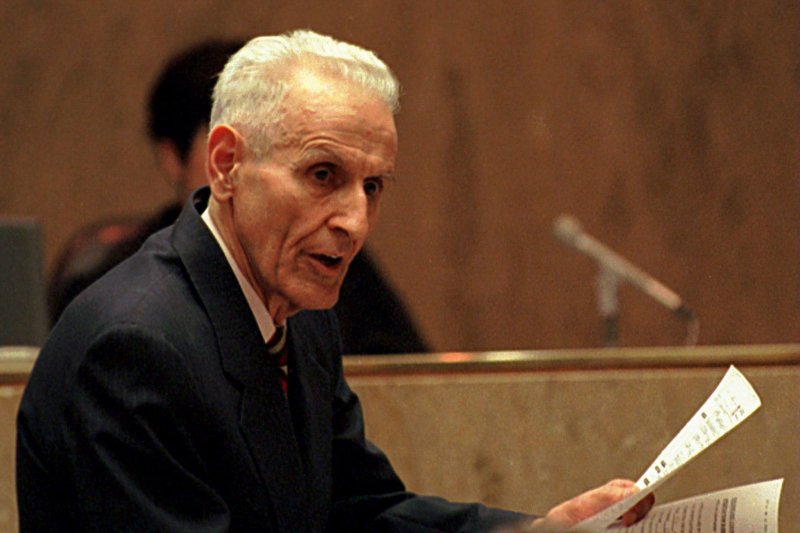A collection of materials relating to Dr. Jack Kevorkian, which were donated by his niece, is now available to the public at the University of Michigan, the school announced Tuesday. Kevorkian, a "right to die" advocate, became known for assisting more than 100 of his patients commit suicide between 1990 and 1998. File Photo by Bill Pugliano/UPI
ANN ARBOR, Mich., Oct. 13 (UPI) -- A collection of papers, video and audio files that cover the life of "Dr. Death" Jack Kevorkian is now available to the public at the University of Michigan, the school announced Tuesday.
The materials, donated by Kevorkian's niece Ava Janus, span more than a century from 1911 to 2014, the university said. Much of the file contains Kevorkian's dealings with assisted suicide patients -- a practice he called "medicide."
"Many of the medicide patients and their families -- who remain very close to this day -- are still advocates of their family member's choice to die, so anonymity was not an issue," Olga Virakhovskaya, the lead archivist who processed the materials, said. "We felt very strongly that by not providing access to this collection and to the medicide files, we would be choosing to hide a very important story."
"Long before Jack Kevorkian was known as 'Dr. Death,' he was a child of Armenian immigrants, a successful student, a graduate of the University of Michigan Medical School, a musician, composer and scientist," said Terrence McDonald, director of the Bentley Historical Library, which houses the archive. "The release of his papers will allow scholars and students to understand the context of and driving forces in an interesting and provocative life."
In addition to the "medicide" materials, the archive also contains communications, published works, manuscript drafts, photographs, court records, news coverage and interviews from Kevorkian, the university said in a news release Tuesday.
Kevorkian was a highly controversial figure during the 1990s, when he assisted more than 100 terminally ill patients in ending their lives. The resulting legal matters and media coverage led to his becoming known as "Dr. Death."
Virakhovskaya said, though, that the collection doesn't only focus on the controversy of assisted suicide.
"He was a brilliant student who graduated high school early. He spoke several languages and he was very artistically gifted," she said. "Much of his 'dark' artwork that focuses on the subject of death can be found in these archives, along with recordings of his musical compositions."
Kevorkian was acquitted three times in legal proceedings related to his assisting patients with suicide. He was ultimately convicted of second-degree murder and served eight years in prison. He died in 2011 at the age of 83, four years after he was released from prison.















